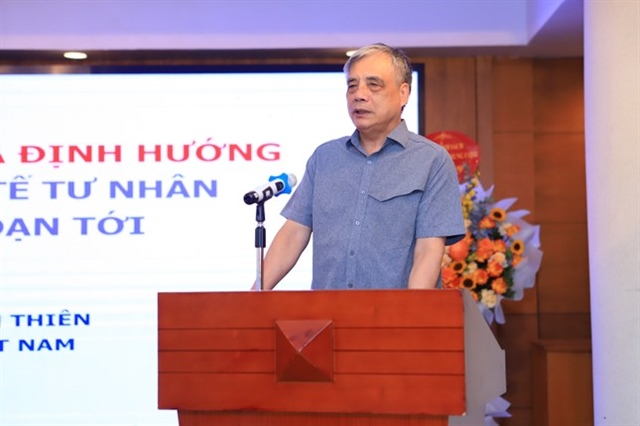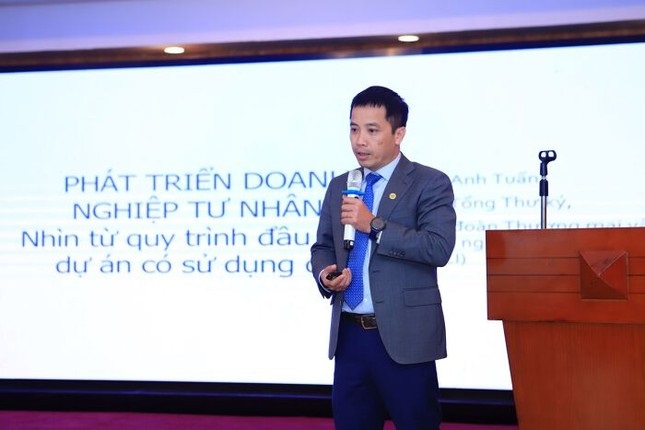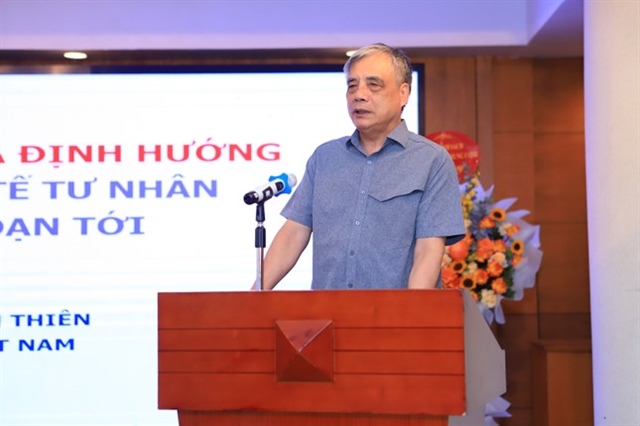Extraordinary Efforts Needed
Speaking at the seminar “Private Economy is the Most Important Driving Force of the Economy” hosted by the Vietnamese Private Entrepreneurs Association today (May 26) in Hanoi, Associate Professor Dr. Tran Dinh Thien assessed that the private sector is facing numerous challenges at a time when it is entrusted with a great mission and high expectations.
“Previously, for every two enterprises established, one withdrew, but now the ratio is almost 1-1. The fundamental problem lies in the challenging business environment. Enterprises are not only ‘slow to grow’ but also facing many obstacles, exacerbating the abnormalities in overall development and difficulties arising from the international context,” said Mr. Thien.

Associate Professor Dr. Tran Dinh Thien. |
According to Associate Professor Dr. Tran Dinh Thien, extraordinary and outstanding efforts are needed, not only from enterprises but also from the State, in removing institutional barriers hindering development, including infrastructure, human resources, and legal framework; creating a fair and unbiased competitive environment among different economic sectors.
“More importantly, instead of merely ‘untangling,’ the mechanism and policies should facilitate conditions for private enterprises to rise to a new level,” he said, emphasizing the need to build and support the development of Vietnamese production chains, led by domestic economic groups, with the participation of Vietnamese enterprises.
Overly Complex Investment Procedures
Mr. Dau Anh Tuan, Deputy Secretary-General and Head of the VCCI Legal Department, shared that immediately after Resolution 68 was issued, VCCI reviewed the obstacles in the implementation process of investment projects. Enterprises investing in projects involving land use have to go through procedures from master planning, subdivision planning, to approval of investment policies, investor selection, land procedures, land leasing, etc.
“The procedures are very complicated, involving at least 15 major procedures, along with numerous minor ones,” said Mr. Tuan. Enterprises often have to navigate through various agencies and sectors. Each stage involves specialized fields, with the participation of multiple levels of government – from local to central.

Mr. Dau Anh Tuan, Deputy Secretary-General and Head of VCCI Legal Department.
|
According to the VCCI Deputy Secretary-General, many procedures can be reformed and adjusted immediately. “Recently, Prime Minister Pham Minh Chinh has spoken a lot about why we have detailed planning, invested in industrial parks, and even had environmental impact assessments, but each project has to go through the process again. This is a procedural waste. The Prime Minister even mentioned that if there are specific standards, investors can implement first, and the Government can monitor and inspect afterward,” Mr. Tuan said.
Recently, the Law Amending and Supplementing a Number of Articles of 4 Laws on Investment has introduced special investment procedures, carried out through the post-inspection process, where investors only need to have investment consulting organizations confirmed by the State and can implement the project, with the State monitoring through a concise procedure. However, this investment model, which is gradually being deployed, only applies to high-tech investors.
Mr. Tuan hopes that the regulations can be extended to other projects, especially in the production field of private enterprises.
Ms. Nguyen Thi Nga, Vice President of the Vietnamese Private Entrepreneurs Association and Chairwoman of BRG Group, expressed: “Private enterprises desire consistency in policies so that we don’t have to worry whether, in ten years, there will be any documents or regulations that we have to reconsider. Entrepreneurs are willing to dedicate their utmost efforts, but we need peace of mind that we are doing things correctly and following the right guidelines, in line with Resolution 68.”
Viet Linh
– 18:45 26/05/2025
















